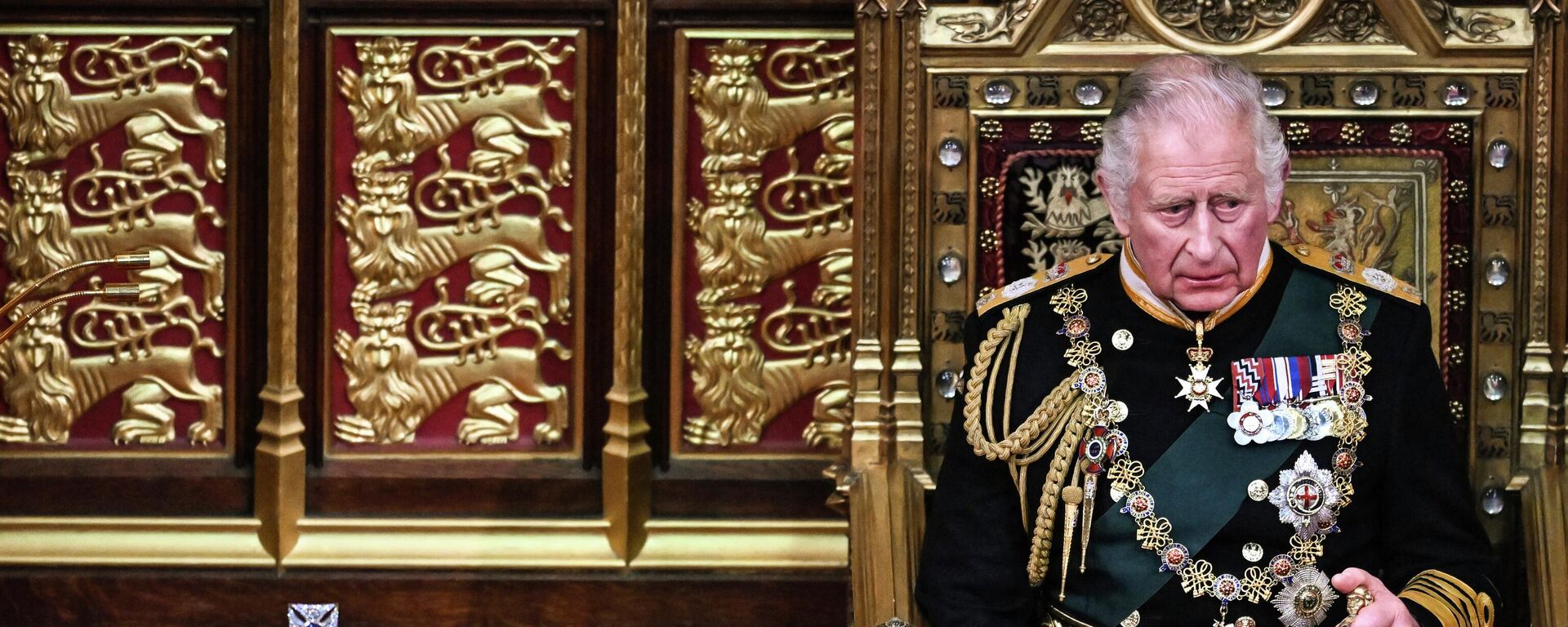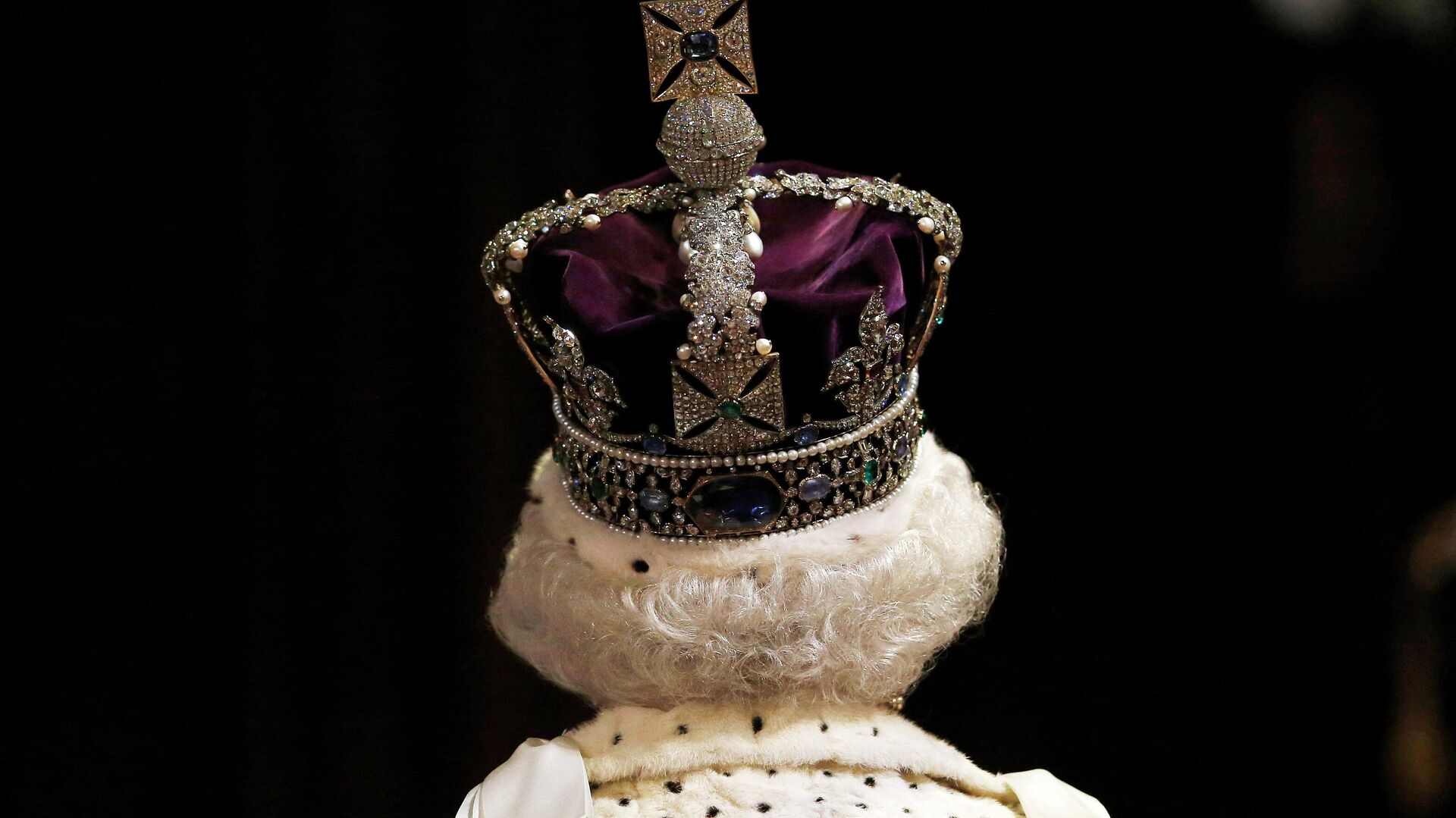https://sputnikglobe.com/20220909/calls-to-remove-british-monarch-as-head-of-state-intensify-across-commonwealth-after-queens-demise-1100595773.html
Calls to Remove British Monarch as Head of State Intensify Across Commonwealth After Queen's Demise
Calls to Remove British Monarch as Head of State Intensify Across Commonwealth After Queen's Demise
Sputnik International
While attending the Commonwealth Heads of Government Meeting (CHOGM) in Rwanda in June, Charles admitted to the British royal family’s complacency in slavery... 09.09.2022, Sputnik International
2022-09-09T13:45+0000
2022-09-09T13:45+0000
2022-09-09T13:45+0000
world
queen elizabeth ii
king charles iii
caribbean
slave trade
australia
british empire
https://cdn1.img.sputnikglobe.com/img/07e6/09/09/1100606043_0:141:3141:1907_1920x0_80_0_0_cd6e8b5de93c53baf8e1d9de00f2e528.jpg
The demise of Britain’s longest-serving monarch Queen Elizabeth II on Thursday has led to renewed calls across the Commonwealth Realm to replace the British monarch as head of state.Queen Elizabeth II, who ascended to the throne in 1952, was formally the head of state of 14 other countries in North America and the Australia-Oceania region — Canada, Australia, New Zealand, Belize, the Bahamas, Jamaica, St Vincent and the Grenadines, St Kitties and Nevis, Antigua and Barbuda, St Lucia, Grenada, Tuvalu, the Solomon Islands, and Papua New Guinea. All of the countries are constitutional monarchies where the British monarch holds symbolic powers such as approval of a new Cabinet.Separately, she also headed the Commonwealth of Nations, an association of 55 nations apart from Britain, most of which were formerly ruled by the United Kingdom. However, most of the countries in the 56-nation group, excluding the 14 constitutional monarchies, have proclaimed themselves as "republics" with their own heads of state.The push to become a republic by replacing the Queen with a native head of state has traditionally found resonance among many countries in the realm, with the succession of Charles III as the King only reinvigorating old debates.Greens’ Senator Mehreen Faruqi said that she “cannot mourn the leader of a racist empire.”Peter Fitz Simmons, the leader of the Australian Republican Movement, noted in his condolence message on Friday that the Queen had supported Australia’s right to become a “fully independent nation” during a referendum in 1999, which was called to decide whether Canberra should part ways with the monarchy.Australian Prime Minister Anthony Albanese, known to espouse republican views like many in the Labor Party, said in an interview that it isn’t the time to talk about the republic issue today.Caribbean Countries Call for Slavery Reparations from Charles IIIMeanwhile, several Caribbean nations headed by the British monarchy have not only called for becoming republics, but also demanded slavery reparations from Charles III, who has succeeded Queen Elizabeth.Millions of Africans are estimated to have been sold off into the trans-Atlantic slave trade by the European colonial powers between the 15th and 19th centuries, according to various records. They were transported to sugarcane, banana, and other plantations in the Caribbean and across the region, where they were forced to work under grueling conditions.The Jamaican government last year said that it would ask Britain to pay reparations for around 600,000 people who were forcibly transported as part of the slave trade by British slaveholders.Jamaica’s Leader of Opposition Mikael Phillips in 2020 filed a parliamentary resolution calling for the British monarch’s removal as the head of state.She also urged Charles to deliver the “justice required of the times.”David Denny, the general secretary of the Caribbean Movement for Peace and Integration, urged for all countries of the region to now work towards “removing the royal family as head of state of our nations.”"Whoever will take over the position should be asked to allow the royal family to pay African people reparations," Denny said.
https://sputnikglobe.com/20220908/director-of-british-monarchist-society-death-of-queen-elizabeth-marks-end-of-crown-before-family-1100564804.html
caribbean
australia
Sputnik International
feedback@sputniknews.com
+74956456601
MIA „Rosiya Segodnya“
2022
News
en_EN
Sputnik International
feedback@sputniknews.com
+74956456601
MIA „Rosiya Segodnya“
Sputnik International
feedback@sputniknews.com
+74956456601
MIA „Rosiya Segodnya“
queen elizabeth ii, king charles iii, caribbean, slave trade, australia, british empire
queen elizabeth ii, king charles iii, caribbean, slave trade, australia, british empire
Calls to Remove British Monarch as Head of State Intensify Across Commonwealth After Queen's Demise
While attending the Commonwealth Heads of Government Meeting (CHOGM) in Rwanda in June, Charles admitted to the British royal family’s complacency in slavery, which he described as the “most painful period of our story.” However, Charles stopped short of endorsing reparations for the slave trade, a key demand of Caribbean countries.
The
demise of Britain’s longest-serving monarch Queen Elizabeth II on Thursday has led to renewed calls across the Commonwealth Realm to replace the British monarch as head of state.

8 September 2022, 21:28 GMT
Queen Elizabeth II, who ascended to the throne in 1952, was formally the head of state of 14 other countries in North America and the Australia-Oceania region — Canada, Australia, New Zealand, Belize, the Bahamas, Jamaica, St Vincent and the Grenadines, St Kitties and Nevis, Antigua and Barbuda, St Lucia, Grenada, Tuvalu, the Solomon Islands, and Papua New Guinea.
All of the countries are constitutional monarchies where the British monarch holds symbolic powers such as approval of a new Cabinet.
Separately, she also headed the Commonwealth of Nations, an association of 55 nations apart from Britain, most of which were formerly ruled by the United Kingdom.
However, most of the countries in the 56-nation group, excluding the 14 constitutional monarchies, have proclaimed themselves as "republics" with their own heads of state.
The push to become a republic by replacing the Queen with a native head of state has traditionally found resonance among many countries in the realm, with the succession of Charles III as the King only reinvigorating old debates.
In Australia, Greens Party MP Adam Bandt said that it is time to “move forward” by formally declaring the country as a republic.
Greens’ Senator Mehreen Faruqi said that she “cannot mourn the leader of a racist empire.”
Peter Fitz Simmons, the leader of the Australian Republican Movement, noted in his condolence message on Friday that the Queen had supported Australia’s right to become a “fully independent nation” during a referendum in 1999, which was called to decide whether Canberra should part ways with the monarchy.
Australian Prime Minister Anthony Albanese, known to espouse republican views like many in the Labor Party, said in an interview that it isn’t the time to talk about the republic issue today.
“Today's a day for one issue and one issue only, which is to pay tribute to Queen Elizabeth the Second,” he stated.
Caribbean Countries Call for Slavery Reparations from Charles III
Meanwhile, several Caribbean nations headed by the British monarchy have not only called for becoming republics, but also demanded slavery reparations from Charles III, who has succeeded Queen Elizabeth.
Millions of Africans are estimated to have been sold off into the trans-Atlantic slave trade by the European colonial powers between the 15th and 19th centuries, according to various records.
They were transported to sugarcane, banana, and other plantations in the Caribbean and across the region, where they were forced to work under grueling conditions.
The Jamaican government last year said that it would ask Britain to pay reparations for around 600,000 people who were forcibly transported as part of the slave trade by British slaveholders.
Jamaica’s Leader of Opposition Mikael Phillips in 2020 filed a parliamentary resolution calling for the British monarch’s removal as the head of state.
Niambi Hall-Campbell, the chair of the Bahamas National Reparations Committee, told Reuters that the imminent succession of Charles III to the throne could be an “opportunity to advance discussions of reparations for our region.”
She also urged Charles to deliver the “justice required of the times.”
David Denny, the general secretary of the Caribbean Movement for Peace and Integration, urged for all countries of the region to now work towards “removing the royal family as head of state of our nations.”
"Whoever will take over the position should be asked to allow the royal family to pay African people reparations," Denny said.





